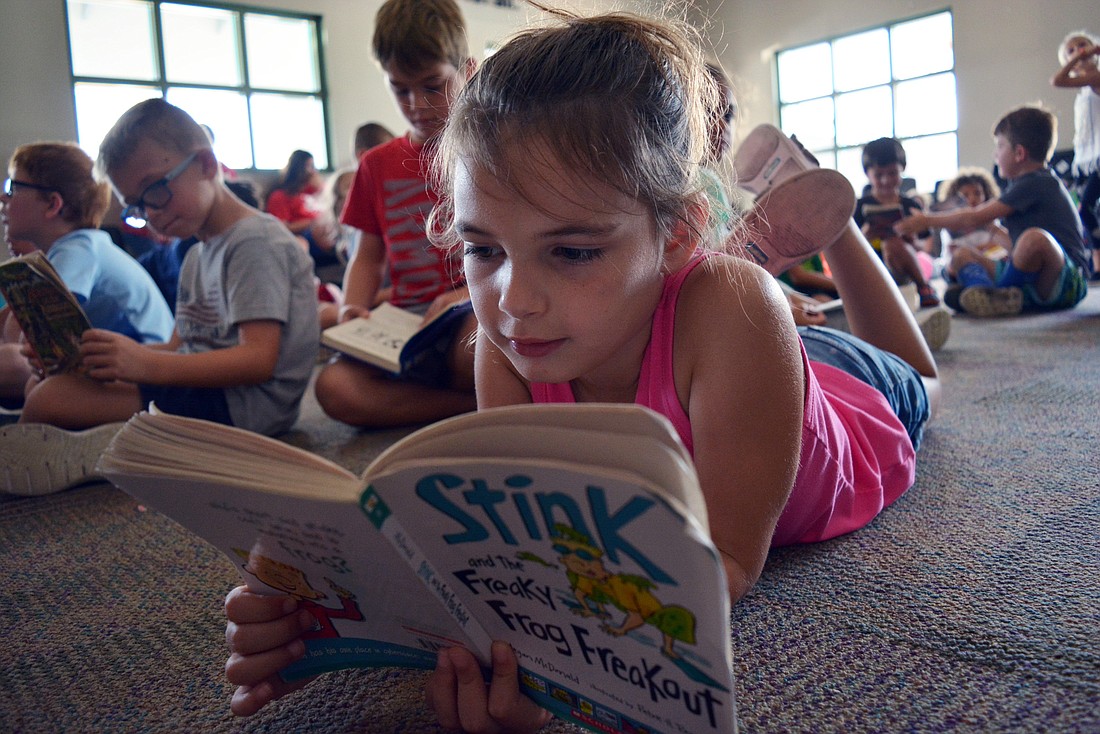- November 15, 2024
-
-
Loading

Loading

During a day camp at the Lakewood Ranch YMCA in June, East County 6-year-old Riley Makeever rested on the floor with her hands around a book.
She might have preferred to be swimming, but she didn’t mind reading “Stink and the Freaky Frog Freakout” one bit.
“I like reading,” she said.
Every day of camp at the Lakewood Ranch YMCA, children spend 30 to 45 minutes reading, which helps Makeever and others keep their critical reading skills fresh. The effort is part of The Patterson Foundation’s Suncoast Summer Reading Challenge, which is aimed at preventing children from falling behind academically over the summer by having them read at least six books.
Statistics show that children who don’t have reading as part of their regular summertime activities can lose two to three months’ worth of literacy skills, said Beth Duda, director of The Patterson Foundation’s Suncoast Campaign for Grade-Level Reading, which administers the Suncoast Summer Reading Challenge.
“The whole motivation behind the reading challenge is to have children continue to read over the summer, so they aren’t losing those important reading skills,” Duda said. “The reading challenge isn’t prescriptive about what books the children read or what they do. It’s more about rewarding the children for reading anything over the summer.”
The foundation provides colored silicone bracelets to motivate children to read books, and each participating agency determines how it will distribute them. To support the initiative, it also provides $500 a week for materials or other needs to providers, such as the YMCA, which has at least 30 children who qualify as low-income.
Duda said the Lakewood Ranch area is not immune from low-income challenges. Data from the Florida Department of Education for the 2018-19 school year shows about 4,400 of 14,000 students from 13 East County schools — more than 30% — qualified for free lunches.
“The community at first glance may not look like kids are living in a food-insecure world, but you can see even in some of the schools we would consider in an affluent neighborhood — many of them have a significant number of students who qualify for free and reduced meals,” Duda said.
Duda said The Patterson Foundation provided training to this year’s 90 participating providers to create ways to incorporate literacy into the programming. Activities could include basketball shooting games using vocabulary words or having children make puppets that share stories the children write themselves.
Lakewood Ranch YMCA Camp Director Britta Casey said that this year, the YMCA has adapted its reading challenge strategies according to age level. For example, a group of middle school campers is reading a book together with their counselor and having book discussions during their 45 minutes of reading time each day. Younger campers sit quietly and read to themselves.
“We bought a ton of new books trying to get everyone engaged,” Casey said. “They’ve been enjoying it.”
Last summer, the Lakewood Ranch YMCA participated for the first time in the program, and data showed its average of 73 weekly participants read 1,006 books over the 10-week summer. Duda said data showed Lakewood Ranch YMCA campers gained an average of one-half month in literacy skills, Duda said.
Program-wide, 41% of reading challenge locations last summer had learning gains while 62% had no loss of reading skills, Duda said.
Duda said The Patterson Foundation piloted the reading challenge program two summers ago with 22 providers and that last year had 86 providers. This year, there are 90 participating providers impacting about 8,300 children.
Although The Patterson Foundation provides financial support to camps supporting low-income children, any camp can participate in its summer reading challenge, she said.